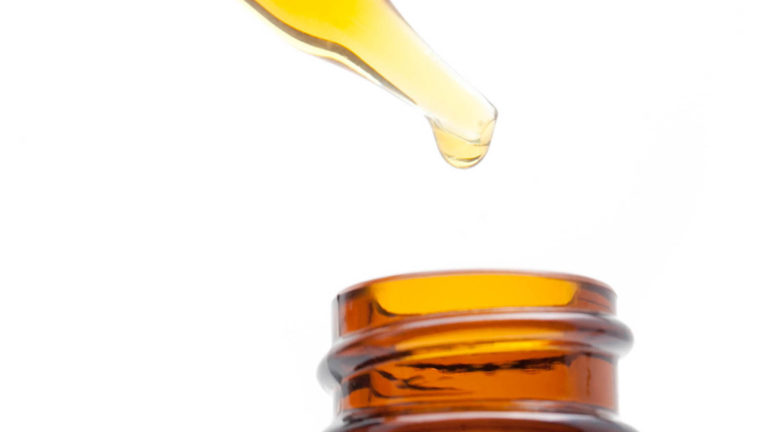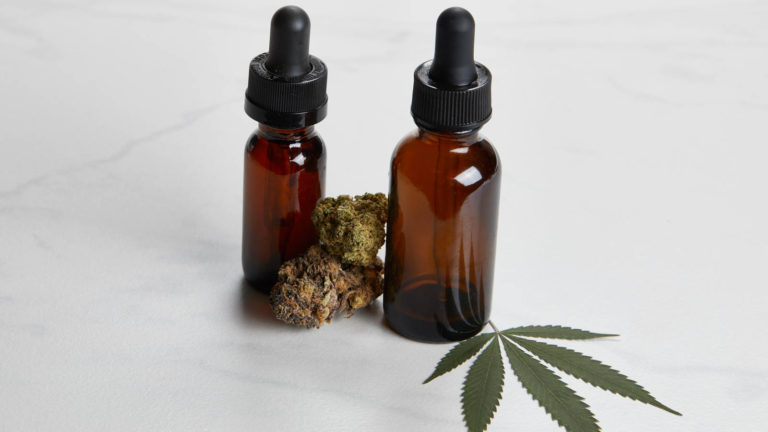It's currently not legal to grow, process, or sell hemp or hemp-derived products in Alaska. Although Alaska established its Industrial Hemp Pilot Program in 2018, the rules to accompany the program are yet to be finalized. The growth, production, cultivation, marketing, or sale of industrial hemp remains illegal until the regulations surrounding the program have been adopted.
Conversely, cannabis is legal in the state of Alaska for both medicinal and recreational purposes. Medical marijuana was legalized in 1998, and recreational legalization followed in 2015 for individuals aged 21 years or older. The public use of cannabis is banned, and possession of cannabis on federal property, such as national parks, is also illegal.
What is CBD?
CBD is a non-intoxicating cannabinoid found in cannabis and the second-most prominent in the plant after THC, which is mostly responsible for producing an intoxicating high. CBD can be sourced either from marijuana or hemp plants and has a wide range of potential therapeutic benefits.
 Photo by: Gina Coleman/Weedmaps
Photo by: Gina Coleman/WeedmapsImage lightbox

To date, researchers have identified a number of potential applications linked to CBD, including anti-inflammatory, analgesic, anti-anxiety, and anti-seizure properties. Further, the chemical has shown promise in treating numerous health conditions, including seizure disorders, mood disorders such as depression, anxiety, and psychosis, chronic pain, and many more.
Most raw cannabis strains on the market today contain small amounts of CBD, especially compared with THC. But since the cannabinoid has gained considerable attention for its wide range of purported therapeutic benefits, more high-CBD strains have recently been cultivated.
Why is CBD sometimes illegal?
All types of cannabis, including hemp strains that don't produce enough THC to cause intoxication, were considered illegal under the Federal Controlled Substances Act of 1970. The law categorized all cannabis as Schedule 1, which defined the plant as a highly addictive substance with a high potential for abuse and no accepted medical use.
The 2018 Farm Bill re-classified hemp as an agricultural commodity and made its cultivation federally legal. Further, the act removed some forms of cannabis from Schedule 1 status by creating a legal distinction between hemp and marijuana. Hemp is cannabis with less than 0.3% THC, and marijuana refers to cannabis with more than 0.3% THC. This distinction in federal law effectively legalized CBD that is derived from cannabis with less than 0.3% THC, as long as it has been cultivated according to federal and state regulations.
The 2018 Farm Bill legislation does not mean that CBD derived from hemp is universally legal throughout the United States. According to the Farm Bill, the Food and Drug Administration (FDA) has the power to regulate CBD product labeling, including therapeutic claims and the use of CBD as a food additive.
The FDA has declared that hemp-derived CBD may not legally be added to food and beverages, or marketed as a dietary supplement. Although the organization has begun to re-evaluate some of its stances on legal CBD products, the FDA has not revised its regulations. The agency also has been strict in its position against any labeling that could be perceived as a medical claim about CBD.
In addition to the federal regulation of CBD, the Farm Bill also gave states the option to regulate and prohibit the cultivation and commerce of CBD. States may regulate CBD in food, beverages, dietary supplements, and cosmetic products independently, even before the FDA finalizes its policies.
Alaska CBD laws
In April 2018, the state of Alaska enacted Senate Bill 6, which authorized the state to move forward with the development of its hemp pilot program. The bill defines industrial hemp as any part of the cannabis plant with a concentration of less than 0.3% THC. Although Alaska's definition of industrial hemp pre-dated the 2018 Farm Bill, it is in alignment with the current federal definition.
 Photo by: Gina Coleman/Weedmaps
Photo by: Gina Coleman/WeedmapsImage lightbox

Following the passing of the 2018 Farm Bill, the state of Alaska has proposed regulations surrounding hemp and hemp-derived CBD products. While the regulations were proposed in May 2019, they have yet to be finalized or adopted as law. The Department of Natural Resources will oversee the cultivation of industrial hemp and production of industrial hemp products in Alaska.
According to a state document, until the final regulations have been adopted, the growth, production, cultivation, marketing, or sale of industrial hemp remains illegal. The Alaska Department of Law Consumer Protection Unit has additionally released a statement declaring that the sale of CBD products in Alaska has not been authorized.
The proposed regulations stipulate that all industrial hemp products undergo a cannabinoid potency test to determine cannabinoid concentrations. Industrial hemp products cannot make any health, medical, or therapeutic claims on their labels. Products must also follow strict labeling requirements.
Labels (including CBD oil) must include:
- The product name;
- A batch and lot number for the product;
- An expiration date;
- The total quantity of the product by weight or volume;
- The serving size or recommended dose;
- A list of all ingredients;
- A statement that the product has not been approved by the Food and Drug Administration or the Alaska Department of Environmental Conservation.
- The industrial hemp pilot program from which the hemp originated;
- The industrial hemp pilot program that authorized the processing or testing of the industrial hemp in the product; and
- If the product contains any delta-9-THC the label must provide a warning.
CBD derived from cannabis is available for purchase from licensed state retailers.
Licensing requirements for CBD
Under the proposed rules, growers, processors, and retailers of industrial hemp and hemp-derived products, including CBD oil, will be required to apply for licensing from the Alaska Department of Natural Resources. Registrations will be valid from the date of registration until January 1st of the following year and will need to be renewed annually.
Applications for growing, processing, and retail licenses must include the applicant's full legal name, any applicable business licenses, and the address, GPS coordinates, and map of the industrial hemp production area.
Applicants must also pay application and registration fees. The proposed fee schedule includes a:
- $100 non-refundable application fee ($50 non-refundable application fee for renewals);
- $200 annual grower registration fee;
- $250 annual processor registration fee (for products not intended for animal or human consumption);
- $650 annual processor registration fee (for products intended for animal or human consumption);
- $300 annual retailer registration fee.
The proposed rules would grant registered growers the authority to grow, store, and sell raw industrial hemp. Harvests will be sampled and tested by the state to check THC concentration.
Growers will not be permitted to grow or store industrial hemp in any building primarily used for residential purposes, or to process industrial hemp.
Alaska CBD possession limits
The cultivation, processing, and sale of hemp is currently illegal in the state of Alaska. Although the sale of hemp-derived CBD is unauthorized by the state, there is presently little enforcement. There are no clearly defined penalties for those found in possession of hemp-derived CBD products.
There are specified limits for the possession of cannabis. Individuals 21 years of age and older can buy and possess up to one ounce of cannabis from a licensed retailer. Those found in possession of one to four ounces may be charged with a misdemeanor, receive up to one year in prison, and be fined a maximum of $10,000. Those found with more than four ounces may be charged with a felony, receive up to five years in prison, and be fined a maximum of $50,0000.
Where to buy CBD in Alaska
While the sale of hemp-derived CBD products is currently unauthorized in Alaska, there are retailers who sell CBD products or include it as an additive in food. The Alaska Department of Law Consumer Protection Unit has warned consumers to be vigilant as such products are unregulated and untested.
 Photo by: Gina Coleman/Weedmaps
Photo by: Gina Coleman/WeedmapsImage lightbox

CBD derived from cannabis can be purchased by individuals 21 years of age or older from licensed retailers.
How to read CBD labels and packaging
The 2018 Farm Bill shifted the oversight of hemp and hemp-derived products from the U.S. Department of Justice (DOJ) to the U.S. Food and Drug Administration (FDA). The FDA does not presently allow CBD-infused food, drinks, or dietary supplements to be sold, and hasn't yet provided regulations for hemp-derived CBD products.
Still, the agency warns that regulations in flux still require companies to make legitimate claims on their labels. Buyers should nonetheless approach CBD products with caution. A CBD product should clearly state what kind of CBD is used.
Full-spectrum CBD oil means the extract contains cannabis-derived terpenes and trace amounts of cannabinoids such as THC. Broad-spectrum also includes other cannabis compounds but has had THC removed during the processing phase. CBD isolate is a pure crystalline powder containing only CBD.
As mentioned, Alaska will likely adopt its own labeling regulations for CBD products. However, most reputable CBD producers generally include the following information on their CBD product labels:
- Amount of active CBD per serving.
- Supplement Fact panel, including other ingredients.
- Net weight.
- Manufacturer or distributor name.
- Suggested use.
- Full-spectrum, broad-spectrum, or isolate.
- Batch or date code.

